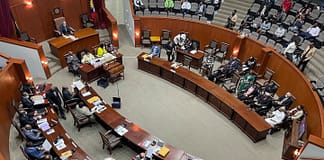
PM Browne Announces Legislative Reforms to Protect Hotel Workers’ Tips and Strengthen Hospitality Union
Prime Minister Gaston Browne has announced a legislative push to ensure that tips in the hospitality industry are recognized as the sole property of employees, preventing employers from withholding or misappropriating gratuities.
During a recent discussion, Browne revealed that amendments to the Labour Code and Companies Act are in progress to address key concerns affecting hospitality workers.
Among the proposed changes is a mandate that all tips collected must be paid directly to employees, ensuring that gratuities remain the rightful earnings of workers rather than being controlled by hotel management.
“We will be legislating the issue of tips so that tips will be payable to the employee and are the property of the employee, not the employer,” Browne stated.
Beyond the regulation of tips, the Prime Minister outlined additional legislative reforms aimed at strengthening labor protections in the hospitality sector.
One major change involves holding the property-owning company accountable for severance payments in cases of liquidation or sale.
Under the current system, some hotels operate through shell companies that lack substantial assets, leaving workers vulnerable when businesses shut down or change ownership.
“We are making changes to ensure that the company that owns the property generating the hotel’s economic activity is liable for severance payments—not just a shell company,” Browne explained.
Hospitality Union Gains Momentum
The proposed changes come amid growing momentum for a Hospitality and Allied Workers Union, which aims to provide stronger representation for hotel employees, restaurant staff, taxi operators, and other workers within the tourism industry.
Browne noted that the movement is generating regional interest, with inquiries coming from other Caribbean nations about forming similar unions.

“The hospitality sector has been treated like a plantation for too long. Workers are saying they want their own union to negotiate better wages, better working conditions, and to ensure their interests are properly represented,” he said.
The Prime Minister also criticized traditional labor unions for failing to address workers’ needs, pointing to alleged financial mismanagement within the Antigua Workers’ Union (AWU).
He highlighted concerns that significant funds were being wasted on non-essential expenses rather than being reinvested to benefit members, such as bolstering pension schemes.
“If the new hospitality union collects up to $160,000 a month and keeps bureaucracy to a minimum, it could potentially save $1.2 million a year. That money could be used to improve pension benefits for workers rather than being wasted,” Browne argued.
With increasing interest from hospitality workers in other Caribbean nations, the Hospitality and Allied Workers Union could become one of the largest organized labor groups in the region.
Browne suggested that if successful, this movement could serve as a model for other Caribbean states, reinforcing workers’ rights across the tourism-dependent economies of the region.
The legislative changes and unionization efforts signal a potential shift in labor relations in Antigua and Barbuda’s tourism sector, with the government taking a more active role in ensuring fair treatment and financial security for hospitality workers.
Advertise with the mоѕt vіѕіtеd nеwѕ ѕіtе іn Antigua!
We offer fully customizable and flexible digital marketing packages.
Contact us at [email protected]
















